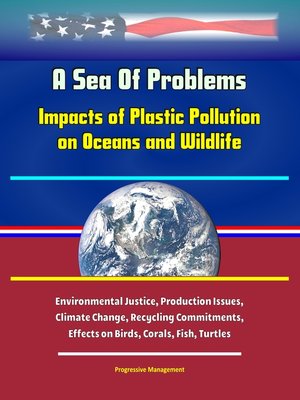A Sea of Problems
ebook ∣ Impacts of Plastic Pollution on Oceans and Wildlife--Environmental Justice, Production Issues, Climate Change, Recycling Commitments, Effects on Birds, Corals, Fish, Turtles
By Progressive Management

Sign up to save your library
With an OverDrive account, you can save your favorite libraries for at-a-glance information about availability. Find out more about OverDrive accounts.
Find this title in Libby, the library reading app by OverDrive.



Search for a digital library with this title
Title found at these libraries:
| Loading... |
This House hearing about plastic pollution was held in late 2019 before the Subcommittee on Water, Oceans, and Wildlife. Chairman Lowenthal commented:
Certainly, single-use plastics have made life easier, but these materials come at a much higher cost than many would like to admit. Plastics last for centuries in the natural environment, and are found nearly everywhere on our planet. There is an estimated 8 million metric tons of plastic that enter the oceans each year at a rate of about one garbage truck per minute, threatening biodiversity and accumulating in the seafood that we eat and in the water that we drink. Plastics have even been found in water samples right here in the Capitol Visitors Center. Plastics are also making climate change worse. The global life cycle emissions from one year's plastic production throughout the United States are about the same as 462 coal- fired power plants per year, and that number is rising. Plastic production is an environmental justice issue, also. Petrochemical factories and incineration facilities are often located in low-income communities, where local health impacts and air quality impacts are quite significant, but frequently are ignored. Finally, in this Subcommittee, we need to look at solutions to deal with, for example, ghost fishing gear, fishing gear that has been lost at sea but continues to catch fish, marine mammals, turtles, birds, and corals.
The Ranking Member, Tom McClintock, observed:
From the tenor of the written testimony, it appears that the Majority is blaming American consumers for the plastic waste that reaches our oceans and is proposing to place restrictions on them that will dramatically reduce the convenience and higher quality of life that plastics have contributed to our modern society. Blaming America first seems to be a recurring theme, but the facts paint a very different picture. A 2017 study published in the Environmental Science & Technology magazine found that between 88-95 percent of all the plastic debris that enters our oceans comes from 10 rivers—none of which is anywhere close to the United States: 8 of those rivers are in Asia and the other 2 are in Africa. According to a 2015 study, the top 20 marine plastic polluters produced as much as 10.76 million metric tons of waterborne plastic debris. The United States generated just 0.11 million metric tons—or barely 1 percent. Indeed, the entire United States contributed less waterborne plastic pollution than North Korea. Who does the Majority blame for this? American consumers. But as Jeane Kirkpatrick once observed, they always blame America first. According to the EPA, Americans have increased plastic recycling from 20,000 tons in 1980 to 3.1 million tons in 2015. American consumers go to great lengths to responsibly dispose of plastic waste— and the numbers show that. American consumers are heroes—not villains—in the fight against plastics pollution of our oceans. We should be celebrating them and not punishing them!
This compilation includes a reproduction of the 2019 Worldwide Threat Assessment of the U.S. Intelligence Community.






